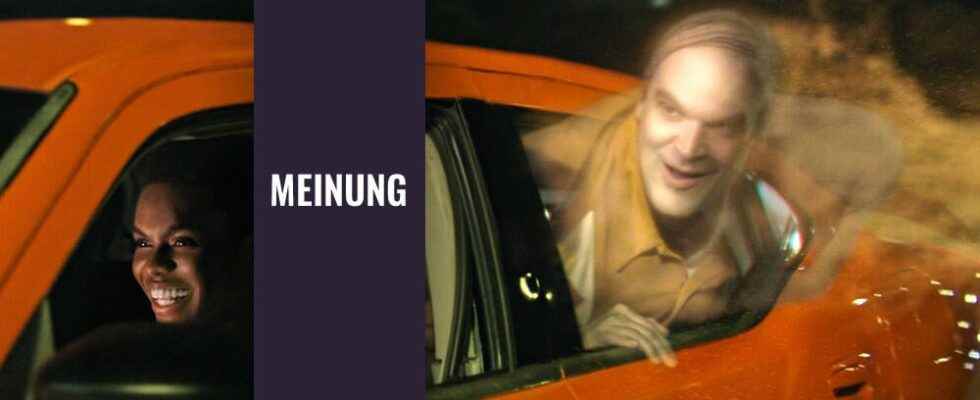We Have a Ghost came to Netflix on February 24, 2023 and is currently at number 1 in the film charts. The fantasy family comedy presents itself like so many Netflix films: neither really good nor terribly bad, a bit entertaining and somehow worth forgetting. If it wasn’t for this one thing: Stranger Things star David Harbor is there and doesn’t say a word throughout the film. Which even enhances We Have A Ghost.
Without words: David Harbour’s silence lifts We Have a Ghost above the Netflix average
We Have A Ghost follows a classic haunted tale as Kevin (Jahi Di’Allo Winston) moves in with his parents and brother old house in which a ghost already resides: Ernest (David Harbour). After the first shock, the family, especially Kevin’s father Frank (Anthony Mackie), uses the transparent lodger to achieve success on social media. Which eventually gets the CIA on the scene.
Watch Netflix’s We Have a Ghost fantasy trailer starring David Harbour
We have a Ghost – Trailer (English) HD
David Harbor perfected the grumpy Sheriff Jim Hopper in Stranger Things. The click from Netflix’s hit series to Netflix’s new fantasy comedy isn’t far away. The pleasant difference between series and film, however, is that the actor is here can let off steam emotionally in a completely new way: namely mute.
In the world of We Have a Ghost, a ghost is incapable of vocally producing more than a moan. Which forces Ghost Ernest to communicate differently with his teenage reference figure, Kevin. The Netflix film often uses this humorously, but goes with it in the important moments one-sided, non-verbal relationship surprisingly dear to the heart.
Netflix
We Have a Ghost: David Harbor doesn’t just goof around
David Harbour’s bald-comb hairstyle could easily tip the mind into the ridiculous. That this does not happen is a remarkable achievement. One that not every Netflix film succeeds in, if we think back to Jason Mormoa’s oddball in Slumberland, for example. But instead of being a joke Ernest, who bears the seriousness in his name, even becomes Antithesis of stupid humor – to a supernatural presence that grounds the film.
Netflix and the Art of Omission: We Have a (silent) Ghost
Watching the runtime of Netflix’ We Have a Ghost, it’s hard to believe that director Christopher Landon (Happy Deathday) left anything out of his film. 2 hours and 6 minutes is definitely too long for a family comedy of this kind. At least with the main character Ernest, the film understands that add omissions can. And David Harbor finds that certain something in his role.
Netflix
We Have a Ghost: David Harbour
My art teacher always said that omitting a main color makes a picture better. Instead of being motley, it is more precise. The Netflix film We Have a Ghost did the same for the human (or ghostly) senses. Because since Ernest has to do without his language as a means of contact, character formation shifts entirely to gestures and facial expressions.
This starts out funny when David Harbor wants to be a ghost’s decal in the attic waving his hands over the top and takes place mostly in the quiet moments when his true emotional life is reflected in slumped shoulders, sad looks and a wrinkled forehead expresses.
What the Stranger Things star expresses on his face can take you by surprise.
We Have a Ghost may not be made for long-term memory. There are even a few cinematic gaffes (keyword: melting face) that should be forgotten quickly. But David Harbour’s silent appearance adds one to his filmography unexpectedly impressive role. And that makes the Netflix fantasy excursion somehow worthwhile in the end.
10 years of Netflix Originals: These series have defined the streaming service
Ten years ago, Netflix changed the world of series forever with the release of House of Cards. Suddenly streaming and binging were the big buzzwords in Hollywood. But what has happened since the launch of House of Cards?
At this point you will find external content that complements the article. You can show it and hide it again with one click.
In the podcast, we dive into the history of the Netflix original series, which can be divided into four phases. In the beginning it was all about wild trial and error and experiments, but in the later phases it was mainly brands and blockbusters like Stranger Things and Wednesday that took over.
*. .
